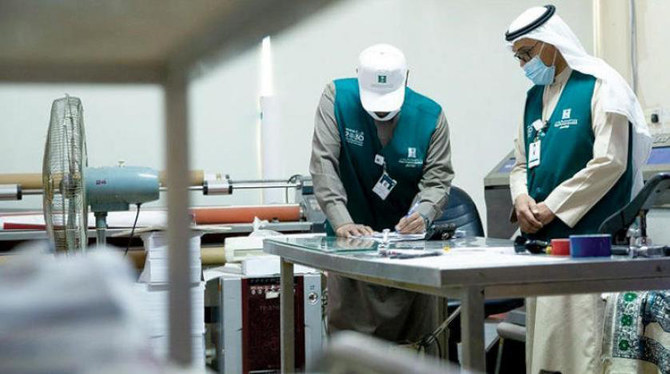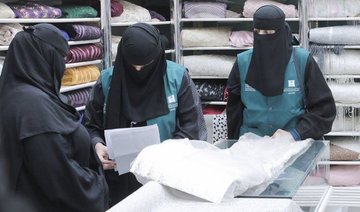JEDDAH: The National Program for Combating Commercial Concealment announced the start of a corrective period for violators of the system, ending on Aug. 23 after a six-month time frame.
“The corrective period of the anti-concealment law began. Those wishing to correct the situation of their businesses can apply electronically and benefit from the advantages of the corrective period and exception from the penalties stipulated in the law,” said a statement on the ministry’s website.
Regulations for correcting legal status relating to commercial concealment, as approved by the Ministry of Commerce, involve six options.
Violators can allow the entry of a non-Saudi partner into a business, or register the ownership of a facility in the name of a non-Saudi, after they fulfill the legal requirements for ownership.
Another option is to continue practicing business activity by introducing a new partner — a Saudi or licensed foreign investor — and registering the change with the Ministry of Commerce.
A Saudi violator can sell or waive a facility, while a non-Saudi violator can obtain the privileged iqama and complete a correction of status by taking advantage of the iqama benefits.
A final option in the corrective period lets a non-Saudi leave the Kingdom permanently through a final exit visa after submitting a pledge to abandon previous business rights, and announcing this through the means specified by the Ministry within a period not exceeding 30 days.
The new corrective regulations also state that an exemption from penalties will not include violators who were arrested before submitting a request to resolve their situation, or those who were referred to the Saudi Bureau of Investigation and Prosecution before submitting their request.
The request to correct a business status will be reviewed to verify that it meets the necessary requirements, and the applicant will be informed of the result within 90 days. The Ministry can extend this period in the event that it is incomplete based on acceptable reasons and justifications.
If a correction to an establishment’s status is incomplete, the applicant will be required to complete other corrective procedures within 180 days from the expiry date of the first deadline.
Talat Hafiz, a Saudi economist, financial analyst, and board member of the Saudi Financial Association, said commercial concealment is a major financial crime in the business environment of any country, including the Kingdom, “since it works against fair and unjustifiable commercial trading and causes significant harm to the economy and to its gross domestic product.”
He said: “The government of Saudi Arabia has been alerted to such risks and consequences of commercial concealment, and has introduced a very powerful national program to combat such economic and commercial disease by implementing the National Program for Combating the Commercial Concealment.”
Also known as the national anti-commercial concealment (Tasattur) program, the initiative aims to combat all types of commercial concealment by enforcing a number of measures and actions, including a gradual requirement for all business outlets to use electronic payment systems in their trade activities.
“This will give the consumer the choice to use different means of payment, in addition to cash payments,” Hafiz said. “This is part of the program’s initiative, under the title ‘Obliging shops and outlets to provide electronic payment systems.’”
In cases where these regulations are violated, stern measures and penalties will be imposed.
The procedures are part of the recommendations and directives of the Saudi leadership, Hafiz said, and are relevant to combating commercial concealment through the consolidation of efforts among several government sectors.
The program’s primary mission is to regulate financial transactions and eliminate the illegal remittance of funds.
“The program was launched by the Ministry of Commerce in Saudi Arabia to limit the spread of commercial fraud and to ensure legal commercial trading in the country,” Hafiz said.
“The participants in the National Program for Combating the Commercial Concealment continue to work together, consolidate efforts and coordinate among each other for the implementation of the program’s recommendations.”
Each authority will carry out its own designated tasks, taking into consideration the fulfillment of the program’s objectives. Evaluations and assessment will be completed by every concerned authority during all implementation stages of the program.
The program ensures that all commercial businesses in Saudi Arabia are legally run and are established in accordance with Saudi commercial law and legal regulations.
“Such programs will limit cases of money laundering, because a well and legally established business doesn’t need to wash its money, and clean it up to converted money that looks and seems that is coming and generated from legal sources,” Hafiz said.
A recent example of commercial concealment crime involved a Saudi citizen and two expats. They were handed severe sentences following questioning by the Saudi Bureau of Investigation and Prosecution.
The Saudi national established two businesses and enabled two men hailing from Africa to handle illicit money for transfer abroad in exchange for payment.
Following the investigation, authorities handed the fraudsters prison sentences for periods of no less than 16 years and fines of no less than SR168,000 ($44,793).
Authorities also seized SR739,990,490 in assets from the three, and imposed a travel ban and prohibited the Saudi national from practicing commercial activity for five years.
Public prosecution handed down an order to deport the two expats following the completion of their prison sentences. On top of this, the accomplices will have their commercial registrations canceled, and are required to collect due Zakat taxes and fees.
The judgment of the case will also be published in two local newspapers, while the illegal funds will be tracked abroad through statutory procedures.



































